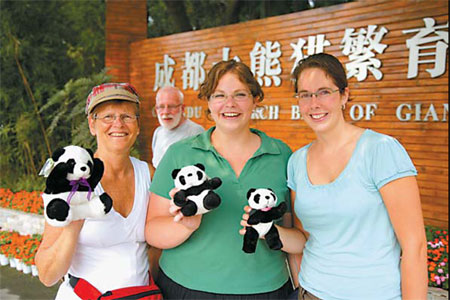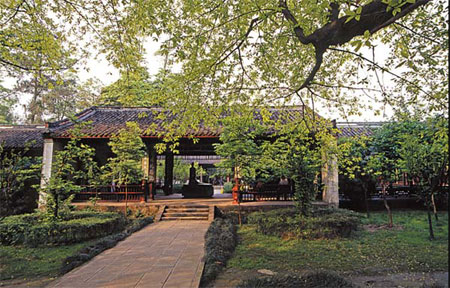 |
|
Overseas visitors in the Chengdu Research Base of Giant Panda Breeding after the May 12 earthquake. [China Daily]
|

|
|
The pavilion with a thatched roof in the Du Fu Thatched Cottage in Chengdu is a landmark of Chengdu. With a history of 2,300 years, Chengdu is a perfect combination of ancient and modern civilizations. [China Daily]
|
After the May 12 Wenchuan earthquake in Sichuan province, wives would ask their husbands who had to go to Chengdu on business to take biscuits, instant noodles and water because they believed the city must have been battered by the quake and did not have enough food or clean water.
As a matter of fact, about one month after the quake, cinemas, museums, libraries, concert halls, restaurants and bars in Chengdu had reopened and were back to normal.
The average occupancy rate of Chengdu's star-rated hotels has risen to 60 percent and some have even reached 80 percent, higher than before the quake, said Deng Gongli, chief of the city's tourism administration.
The city's real estate, tourism, investment and retail sale sectors have also picked up the pieces.
In June, sales at famous retailers in the city such as Wangfujing Department Store, Ito-Yokado, Suning Appliance and GOME Electrical Appliances Holdings picked up, reaching between 80 and 90 percent of their pre-quake levels.
Twenty-three foreign-funded enterprises have registered in Chengdu after the earthquake, with an investment of nearly US$134 million.
Zhou Mi, deputy chief of the Chengdu committee for the promotion of investment, said: 'Chengdu remains the commercial center of southwestern China.'
Ge Honglin, mayor of Chengdu, describes Chengdu as a vital economic hub, an inland city with great potential for economic growth as China promotes the development of its western areas.